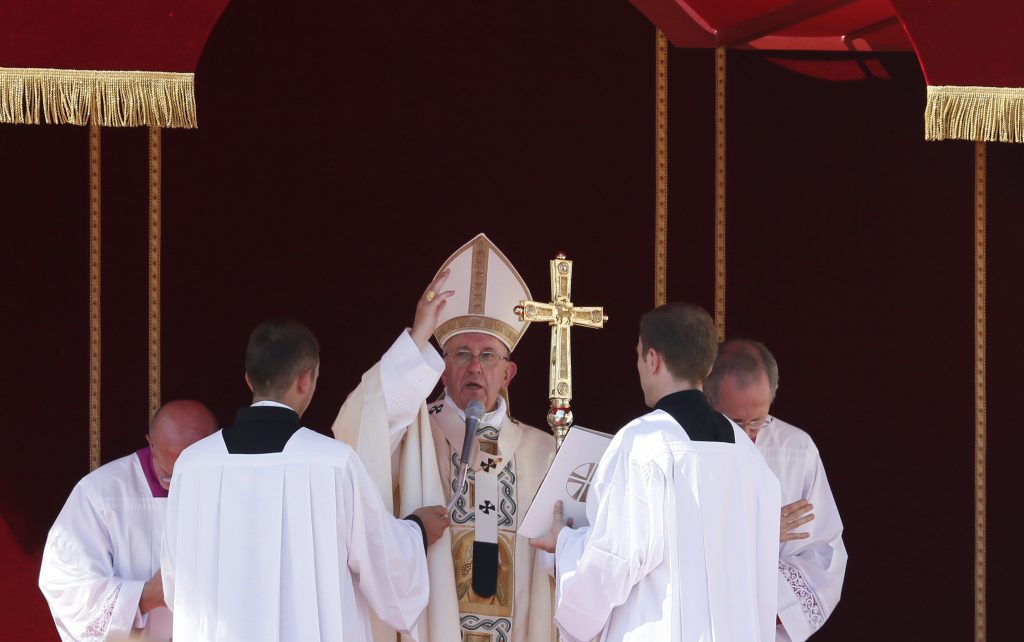This is the fourth part of a series on “Simple Suggestions to Help Improve Parish Sunday Mass.” After the Prayer After Communion, most parishes present their announcements of the activities happening in the parish in the upcoming week. How these announcements are presented, and how much information is provided, is decided by the pastor and parish leaders.
There is no mandate by which this informal moment in the liturgy is to be enacted.
Your parish liturgy committee might consider writing the announcements with wording that focuses on our mission as Church. The choice of which activities to announce might also be considered in the context of the mission of the Church.
The Roman Missal states only: “If they are necessary, any brief announcements to the people follow here.” The dismissal ritual follows the announcements and is in two parts: blessing and dismissal. The presider has the option, on occasion, to use one of various three-fold Solemn Blessings, found at the end of the Concluding Rites in the Roman Missal.
Following these Solemn Blessings are the option of Prayers Over the People. These prayers are an option that can be used prior to the usual short blessing. Both the Prayers Over the People or the Solemn Blessings are used at the discretion of the presider. Consider using one of these options during special seasons or on feasts. These can serve to heighten our awareness of the sacredness of a specific occasion.
On a side note, when the bishop is present for a Mass in your parish, the special blessing for a Pontifical Mass is used.
The Roman Missal provides various word choices for the dismissal. This dismissal is voiced by the deacon, if present, otherwise the presider. “Announce the Gospel” or “glorify the Lord” seem to be more purposefully descriptive of the mission of the church. The choice is up to the deacon or presider, but it is recommended that these words of dismissal be strong and direct, to send the assembly forth with vigor, enthusiasm and conviction.
To each of these, the assembly replies “Thanks be to God” that we are called by God and that the mission is clear. A closing song has become the norm for most parishes, but is not required by the ritual. It offers an opportunity for the assembly to go forth with a deeper sense of unity, as one voice. It is a brief musical moment intended to strengthen the words of dismissal.
In summary, the work of liturgy is never a finished process in a parish. It is, in fact, ongoing. The work of the parish liturgy committee is to ensure that all avenues towards internal and external full, conscious and active participation on the part of every member of the assembly are clear and working effectively. The pastor and the liturgy committee together open, expand and enlarge the symbols and ritual actions of the liturgy, so that everyone can see, know and feel their connection in the prayer.
In 1963, “The Constitution on the Sacred Liturgy” (CSL No. 11) from the Second Vatican Council pointed out that:
“Pastors must therefore realize that when the liturgy is celebrated something more is required than the mere observance of the laws governing valid and lawful celebration; it is also their duty to ensure that the faithful take part fully aware of what they are doing, actively engaged in the rite, and enriched by its effects.”
This is not something the pastor of a parish can do alone. He works together with parish liturgical leaders to ensure that the ritual is held together by the invested action of the whole assembly, and that it is enacted with love and sincerity.
“In the restoration and promotion of the sacred liturgy, this full and active participation by all the people is the aim to be considered before all else; for it is the primary and indispensable source from which the faithful are to derive the true Christian spirit.” (CSL No. 14).
To be fully engaged in the Mass, and to ensure that the liturgy is celebrated fully and authentically, every participant needs to come prepared. Consider spending time throughout the week reflecting on the readings of the upcoming Sunday, reflecting on the feast or season being celebrated, meditating on the life and mission of Jesus Christ, contemplating the mystery of God’s presence and being intentional and disciplined about prayer time. In other words, the Mass is a call to each baptized member to be active in the life and mission of Jesus Christ, both in the liturgy and in life.

